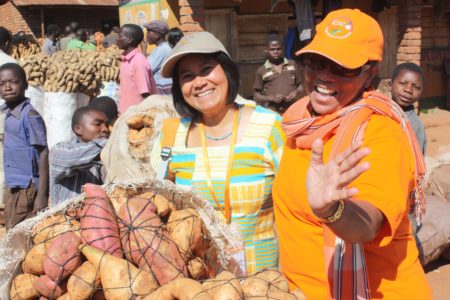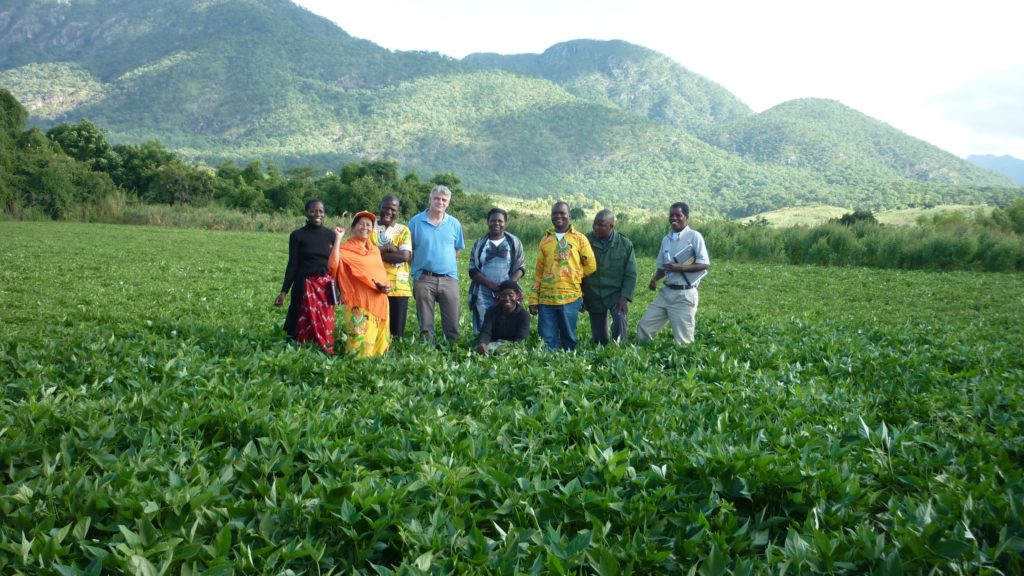
Sweetpotato, a love story
Like most love stories it wasn’t love at first sight for Erna Abidin. As a little girl growing up in Indonesia, she’d eaten ‘kolak ubi’, sweetpotato simmered in coconut milk and palm sugar, prepared by her mother in Padang, West Sumatra. It was a dessert, an afternoon snack that once had caused indigestion and not the life-saving health-infusing crop that would one day capture her heart.
That aching belly was what she remembered most when Dr. Ted Carey working for the International Potato Center (known as CIP for its acronym in Spanish) arrived in Uganda looking to collaborate on sweetpotato variety trials. It was in 1996, and Erna headed the Arapai Agricultural College agronomy department. “Sweetpotato gives me stomach problems,” she told Ted. With his encouragement she decided to give it a second chance.
Discovering a love for sweetpotato
Erna began visiting communities in Northeastern Uganda, where sweetpotato is a staple food. Questions led to more questions. “They know all the varieties,” Erna says of the smallholder farmers she met. She delighted in the stories behind the names. “One has a very rough peel, they call it “Epura Amojong, Epura Imat, Epura Kemat, which means skin like an old woman,” she says. “Another known as Acam Kome Tek ‘the poor hardworking man,’ has a long life cycle and is drought tolerant so it grows well in the dry season.”
With each new taste test, story, and conversation, Erna began to see sweetpotato with new eyes. “It’s like when you first meet someone, and you don’t like them, but then you get to know them better, and you start to fall in love,” she says.
The more she learned, the more she wanted to learn. Inspired by the farmers she was meeting in 2004, she went on to get a Ph.D. at the University of Wageningen in The Netherlands and wrote her thesis using local knowledge as a vehicle to contribute to accelerating the sweetpotato breeding program in Uganda.
More than two decades later what started off as a challenge has blossomed into a full-blown love affair. “Sweetpotato is my life,” says Erna. “Just like a crazy person, even when I’m at a restaurant I’m always talking about sweetpotato.”

Building on farmer knowledge, growing demand
In 2010, Erna moved to Malawi as a project leader for the Irish Aid funded Rooting out Hunger. CIP had launched an ambitious campaign to use biofortified orange-fleshed sweetpotato (OFSP) to counteract the hidden hunger that is rampant across sub-Saharan Africa where Malawi was one of the countries under the Sweetpotato for Profit and Health Initiative (SPHI) program.
Vitamin A deficiency, one of the most pernicious forms of micronutrient deficiency, can lead to blindness, stunted growth, and early death. As little as 125 grams of OFSP a day contains enough beta-carotene to provide children under five with the daily-recommended dose of vitamin A.
For Erna, getting people to adopt OFSP is a bit like playing matchmaker. She observes. She takes notice. She translates her OFSP messaging into lessons people will find attractive, adding her voice to a chorus of OFSP promoters at partner organizations and local government agencies.
“If you go to the clinic, they will give you vitamin A as medicine,” Erna says when she visits communities. “That can be expensive. Use your own crops from your own garden, and this can help you have clear eyesight.” When Erna speaks, there is a smile in her voice, an infectious enthusiasm that invites the most reluctant to give OFSP a try.
Each message is tailored to a particular situation and community. In Malawi maize reigns supreme, it’s served at almost every meal. People think without it they haven’t really eaten.
“We ask why do you like to eat maize, and they say, ‘because we need energy,’” Erna says. “I looked into it, and the energy levels through sweetpotato are much higher.”
Erna and the sweetpotato team took that information back to communities and asked them to try sweetpotato and see how much energy they had. “Don’t think in your mind if you don’t have maize you don’t eat,” she’d tell them. She then encouraged them to include sweetpotato in local recipes, such as using the leaves in soups and sauces and substituting 50 percent of the wheat flour found in bread with sweetpotato puree.
“We need to acknowledge the local knowledge to help us reach our goals,” Erna says. “They already know about sweetpotato. When we work to improve upon what they know, it becomes easier for them to adopt a new way.”
The CIP Malawi team created a music video to help promote the virtues of OFSP.
A walking, talking OFSP advertisement
While others wear their love on their sleeves, Erna wears hers on her fingernails. Whenever she goes to visit communities, she’s clad from head to toe to hand, in ‘OFSP’ orange. CIP has turned the telltale color of OFSP into a brand and even the color of the cars that staff arrive in serves as an advertisement for the health benefits of OFSP.
Erna uses that color to hammer in her messaging. “When I talk I say look at my nails even they are orange,” she says. “Sometimes we work with illiterate people. You cannot give them texts, but they can associate that orange means beta-carotene. Sometimes you need to make a joke. People will remember that small information in between the serious information.”
At CIP getting people to adopt OFSP is a mission, Erna is one of a legion of staff, partners, and government agencies working to get OFSP into the hands of 10 million households in 17 countries in Sub-Saharan Africa by the year 2020. To do so CIP staff, like Erna, use a veritable cornucopia of creative tools: cookbooks, radio dramas, soap opera like open-air dramas, even music videos. The results speak for themselves. After four years in Malawi, the Rooting out Hunger project, helped more than 190,000 households reap the benefits of OFSP.
Erna is approaching a quarter century of sweetpotato research, and that spark of love that started in Uganda shows no signs of waning. Now focused on increasing OFSP adoption in West Africa she is once again learning from the locals the background she needs to help them fall for her beloved crop.
Dr. Putri Ernawati Abidin is based out of Ghana where she currently leads the Jumpstarting Orange-fleshed Sweetpotato in West Africa through Diversified Markets Program. In just 2.5 years, Jumpstarting has helped more than 117,000 households access OFSP in Ghana, Nigeria, and Burkina Faso.
